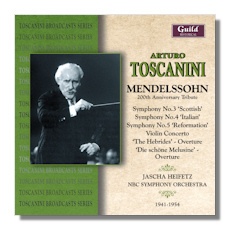
The Internet's Premier Classical Music Source
Related Links
- Mendelssohn Reviews
- Latest Reviews
- More Reviews
-
By Composer
-
Collections
DVD & Blu-ray
Books
Concert Reviews
Articles/Interviews
Software
Audio
Search Amazon
Recommended Links
Site News
 CD Review
CD Review
Felix Mendelssohn

200th Anniversary Tribute
- Symphony #3 in A minor "Scottish", Op. 56 (1842)
- Symphony #4 in A Major "Italian", Op. 90 (1833)
- Symphony #5 in D Major "Reformation", Op. 107 (1830)
- Overture "Die Hebriden", Op. 26
- Overture "Die schöne Melusine", Op. 32
- String Quintet #2 in B Flat Major, Op. 87 (III. Adagio)
- Violin Concerto in E minor, Op. 64 **
- A Midsummer Night's Dream (Overture & "Ye Spotted Snakes") *
* Edna Phillips, soprano
** Jascha Heifetz, violin
NBC Symphony Orchestra/Arturo Toscanini
Monaural "Live" Recordings 1941-1954
Guild Historical GHCD2358/9 2CDs
This is a very interesting release. It covers a wide range of Toscanini's later years, with all three final symphonies and the Violin Concerto as the chief attractions. I should say up front that I've not heard the "studio" RCA versions of the symphonies and overtures, nor have I heard the Naxos Historical import within the "Toscanini Concert" series. Having read about the RCA, those recordings featured words like "stinging" (ClassicsToday), but the same reviews also mentioned the care with which Toscanini was able to shape the music. Reviews of this present set have been primarily positive, with various reservations about sound and interpretation.
I'm willing to take other writers at their word that the performances also found on Testament sound better there. But those are massively expensive, and this Guild set represents better value in nearly every way, at least for me. Furthermore, the NBC Symphony Orchestra never was a great band; as long as I can hear what Toscanini was doing, that's enough for me. As for his contributions, they are flexible in the inner movements and typically aggressive in the outer ones. A notable exception is the "Reformation" Symphony's finale, where instead of rushing through the music, the conductor takes great care to clarify the instrumental interplay. The work isn't an especially good one, and I almost wish that Toscanini had sped through some of the lumpier sections of the work. But the better parts of the piece do sound carefully directed.
On the other hand, Toscanini blasts through the opening of the Midsummer Night's Dream overture and never really takes his foot off the gas. The winds struggle audibly, with an acidic tone. The NBC Strings fight bravely, but they have some difficult moments with articulation. As a performance, this is plenty interesting but a little too rough. And speaking of rough, the very swift "Ye Spotted Snakes" has all kinds of issues. Edna Phillips is an ugly and generally off-key soloist, and so is the un-credited chorus. The unnamed alto soloist is better, and inspires Phillips to find her notes. To my ears, she's a hair flat everywhere else.
The Hebrides that begins disc two finds Toscanini less inclined to rush, and the NBC Symphony responds to the more relaxed outlook with generally fine playing. The strings are warm even if the brass and wind solos are less distinguished than we might expect given the conductor. Still, the rather dry sound doesn't prevent us from hearing Toscanini's persuasive way with this music. Die schöne Melusine shares similar strengths, though here the wind chorales are even more sour, and the sound just as dry. The arrangement from the String Quintet is certainly a rarity, and proves quite beautiful despite being a touch too propulsive for such delicate music.
Jascha Heifetz always proved a fascinating partner for this volatile conductor, and this razor-sharp Mendelssohn Concerto proves no exception. Heifetz is in a fearsome mood here; there is very little patience on the part of the soloist, and even less repose. In fact, the violinist seems to be pushing the NBC Symphony forward. On technical grounds, there are no problems here. Timings for the first two movements cut about a minute off of his EMI version with Beecham, with the finale a hair slower here. If we go simply by the clock, this lines up most closely with his stereo Boston version on RCA. All three are unsurpassed in terms of playing, though Beecham and Munch both feature superior orchestral players and recorded sound. As a historical document, this still impresses.
Finally, the 1954 "Italian" Symphony concludes the set. The sound is harsh and unimpressive; brass and winds sound especially coarse. But the interpretation is thrilling, with Toscanini in a freewheeling mood. The collective virtuosity of the NBC Symphony was obviously improved by the 1950s, and Toscanini still retained his unique blend of discipline and singing warmth. Naturally, the former often overcame the latter, but when they mixed correctly, there were few greater conductors alive. This set features a little bit of everything; the good, the bad, and the ugly. But what's really good is exceptional, so thanks to Guild for giving it to us!
Copyright © 2015, Brian Wigman




















